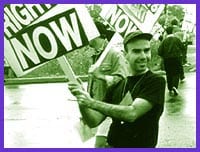In a dramatic presentation during the Little Sister’s customs censorship case, it was a lawyer for the Canadian AIDS Society who packed the most emotional punch, slamming the courts for allowing the killing of gay men.
“Having access to erotica that is presented in a safe-sex manner encourages safe sex,” said Doug Elliott. “By allowing customs to censor these materials that they deem obscene, society is risking the lives of gay men all across Canada.”
The Little Sister’s hearing, in March, is the fourth Supreme Court Of Canada case that the Ottawa-based Canadian AIDS Society (CAS) has involved itself in. (And there have been lots at the provincial level, too.)
“In the history of AIDS, 75 percent of the victims are gay men,” Elliott says. “Therefore, it is important that CAS gets involve in these cases to ensure the quality of life of gay men. It is believed by the CAS that a climate of human rights that respects gays and lesbians promotes self-esteem and in turn safe sex.”
The Canadian AIDS Society is an umbrella group of some 100 community organizations across Canada.
“CAS acknowledges the importance of respecting the rights of gays and lesbians in order for society to effectively tackle the AIDS epidemic,” says Executive Director Sharon Baxter.
And a lot of that involves raunchy sex stuff.
One of the bigger human rights cases took place in Ontario.
In the case known as Carmen M (a heterosexual case involving anal sex with a young girl that stayed at the provincial level), CAS argued that by restricting the age of consent for vaginal sex to 14 and anal sex to 18, the law was discriminating against gay men.
Furthermore, “the government would be limiting the ability for the Canadian AIDS Society to conduct safe-sex counselling to teenagers because it might be viewed as encourage criminal activity,” Elliott adds.
Equality became the focus in the Vriend case where an Alberta teacher was fired for being gay.
“CAS spoke out against the Alberta government saying that by okaying discrimination against gay men, it was creating a climate that was hampering the fight against AIDS,” Elliott says. “People fearing discrimination would be less willing to come forward to seek information about AIDS.”
CAS has also been involved when AIDS is explicit.
Gay sailor Simon Thwaites was fired from the military for having AIDS, after an initial attempt to discharge him for being gay failed.
“There was no evidence that Mr Thwaites could not serve as a sailor,” says Elliott. “He should be judged on his ability to do the job and not his HIV status.”
The case was won and it was one of CAS’s very first high profile involvements.
In the Fisk case, a man was denied widow’s pension after his partner died of HIV.
In the controversial Canadian AIDS Society vs Ontario case in 1996, CAS said that the rights of AIDS victims, many of them gay men, were violated because their blood donations were secretly tested for HIV.
“The names of the donors who tested positive to AIDS were being released by the Red Cross without prior consent,” Elliott says. “It was a long vicious battle and unfortunately, we lost.”
Despite the fact that all cases are not won, CAS’s Baxter says, “It is important for courts to hear our concerns for people living with AIDS. I never walk away from a case feeling like it was a waste of time.”
Elliott tearfully remembers the conclusion of the Krever Inquiry into tainted blood, where he also represented CAS.
“One hemophiliac man came up to me and told me that when he used to be homophobic and that when he got AIDS, he blamed gay men for it. But after hearing what all the sides had to say during the trial, he apologized to me and said that nobody had cared for him other than gay people.
“It just blew me away.”

 Why you can trust Xtra
Why you can trust Xtra


